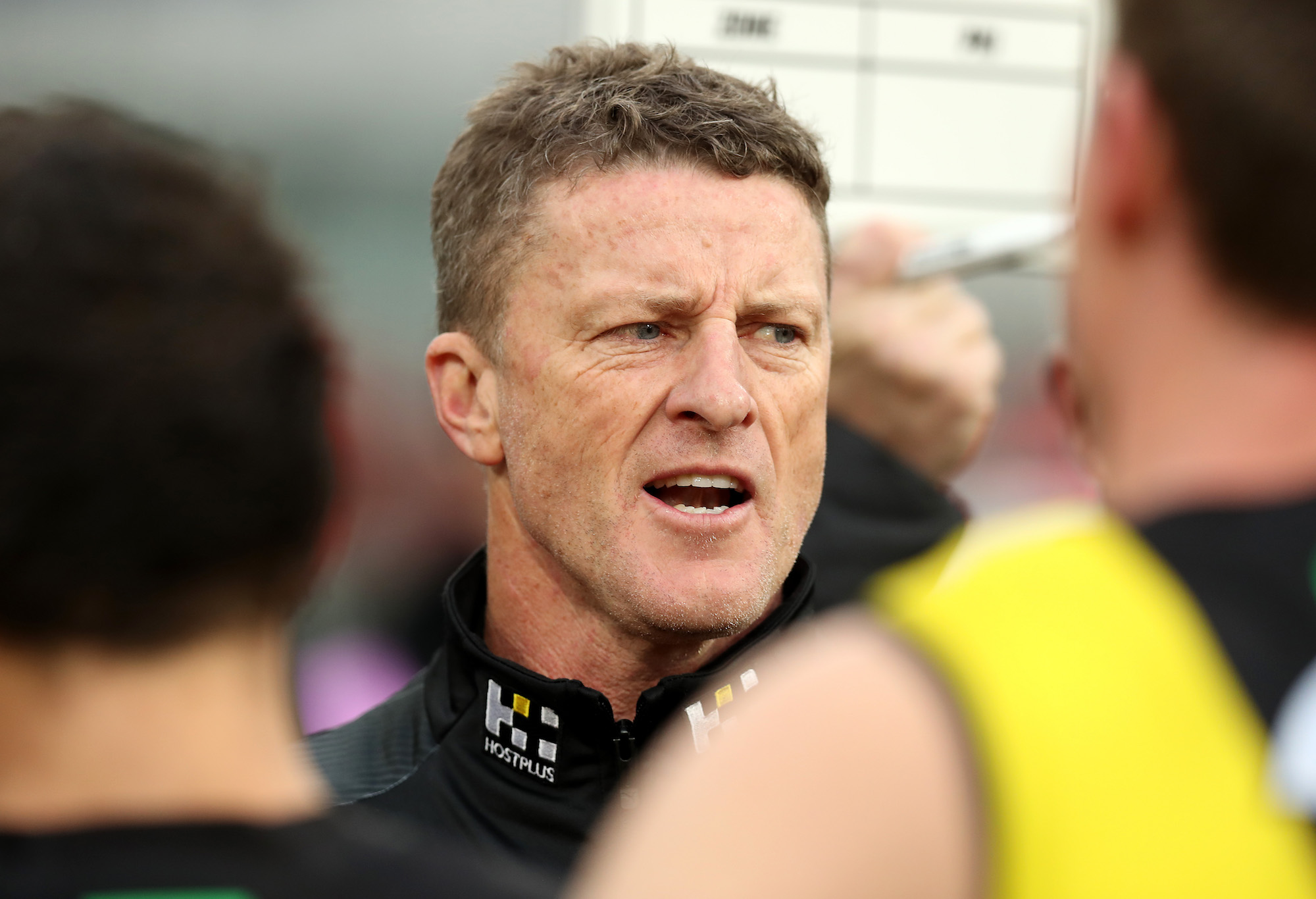In its last 11 games decided by six points or less, the most recent of which was on Saturday against the Western Bulldogs, Richmond hasn’t won a single one of them. Not one.
There have been eight losses and three draws in that run, which dates back to Round 13, 2021.
Last year we saw the polar opposite of this, when between Rounds 11-23 Collingwood won seven games decided by less than a kick, as well as another two by seven points, without dropping one.
People at the Pies and parochial supporters were quick to laud their coaching, training and mental toughness. You’ve heard them all before – “We train for this,” “We know how to win the close ones” and “Our guys just know how to get it done.”
Those that fancy themselves educated observers and data analysts will tell you that close games are decided by nothing more than random chance – sometimes you win, sometimes you lose, and in the end, it all evens out.
Collingwood essentially proved this in the finals series last year, when their training and knowledge mysteriously disappeared when losing their first final to Geelong by six points, and their preliminary final to Sydney by a point.
Richmond’s problem isn’t that it is losing close games of football. It is its inability to defend leads in the first place, to put a game to bed so that it isn’t in a situation where it comes down to one kick either way. That, and not being good enough for long enough when it has proven capable of superior play.
The Tigers kicked seven goals in 15 minutes in the second quarter against the Dogs, taking a 14-point lead into halftime. For the other 105 minutes, they kicked five.
In the Round 1 draw against Carlton, Richmond had 66 inside 50s to 45, but couldn’t muster a winning score. Even Blues coach Michael Voss admitted that they were well outplayed.
In the elimination final loss last year against Brisbane at the Gabba, it was the Tigers that held the biggest lead of the game late in the third quarter. And they were in front for 18 of the last 20 minutes, but not the final two.

(Photo by Michael Willson/AFL Photos via Getty Images)
In the low-scoring draw at Marvel Stadium against Fremantle in Round 19, the last time the Dockers were in front at all was the 24-minute mark of the second term, yet still Richmond couldn’t win.
North Melbourne only won two games last year, yet one of them was against the Tigers by four points, despite losing the inside 50 count by 21 and having 11 fewer scoring shots.
Last season, Richmond also lost to Gold Coast after the siren despite leading by 40 points halfway through the third. They lost to Geelong by three points after kicking 11 out of 13 goals through the second, third and fourth terms, and to Sydney after holding a 31-point lead well into the second half.
The question is not why the Tigers keep losing close games, the question is why are they ending up in them in the first place. Especially so when they have mostly built what should be match-winning leads or dominated the time in the forward half which all coaches crave.
Against the Dogs on Saturday, the reason was clear. In pouring rain and sodden, slippery conditions, the Tigers kept trying to attack through the corridor despite lacking the composure or skill to do so, frequently pinpointing Bulldog opponents and allowing easy inside 50s.
Richmond has never been a skilful kicking team, which has never been more highlighted since the AFL brought in the ‘stand’ rule in 2021. Their successful era was built around getting the ball forward messily and applying frenetic pressure to trap it in.

Damien Hardwick (Photo by Graham Denholm/AFL Photos via Getty Images)
This has also shown up in the Tigers’ inability to defend leads since the rule was introduced. They were very good at crowding the player with the ball after a mark or free kick, with a lot of side-to-side activity on the mark. Without that skill, they are not defensively sound behind the ball.
But they also cannot keep the ball themselves when it is time to play tempo footy and control the game. They turn the ball over, the pressure ratchets up a notch and they no longer have the temperament to handle it.
Damien Hardwick himself has bemoaned the many unforced skill errors Richmond made against Carlton in Round 1, Collingwood in Round 2, and then against the Dogs. But this is the team he has got.
Perhaps Hardwick was only ever the face of the Tigers’ premiership dynasty, and the real genius lay with assistant coaches like Blake Caracella, Craig McRae and Justin Leppitsch. More than one person will tell you that there is no chance Richmond wins the flag in 2017 if not for the arrival of Caracella, and McRae’s quality has been there for all to see at Collingwood.
Perhaps the list at Punt Road is simply too old, too slow, and the youth don’t have the quality or the maturity yet for this list to contend. Perhaps Hardwick’s shortcomings are being exposed – ask yourself when was the last time he outcoached the opposition? Maybe it is all of these things and more.
But the hierarchy at Richmond certainly didn’t believe this at the end of last season, when they traded picks 12, 19 and 31 from last year’s draft, plus their first-round pick at this year’s draft (likely to be a top 10 pick) for 25-year-old Tim Taranto and 26-year-old Jacob Hopper.
The Tigers can play football, there’s no doubt about that. But they don’t do a lot of winning these days. And that’s on Hardwick.






























































































